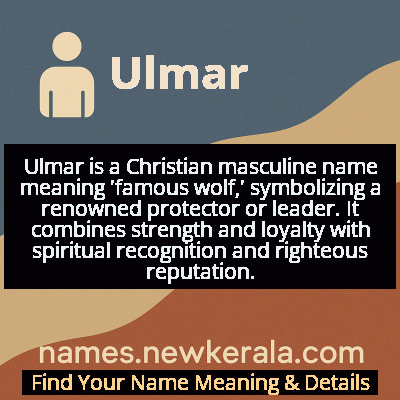Ulmar Name Meaning & Details
Origin, Popularity, Numerology Analysis & Name Meaning of Ulmar
Discover the origin, meaning, and cultural significance of the name ULMAR. Delve into its historical roots and explore the lasting impact it has had on communities and traditions.
Name
Ulmar
Gender
Male
Origin
Christian
Lucky Number
2
Meaning of the Name - Ulmar
Ulmar is a Christian masculine name meaning 'famous wolf,' symbolizing a renowned protector or leader. It combines strength and loyalty with spiritual recognition and righteous reputation.
Ulmar - Complete Numerology Analysis
Your Numerology Number
Based on Pythagorean Numerology System
Ruling Planet
Moon
Positive Nature
Diplomatic, friendly, artistic, empathetic.
Negative Traits
Over-sensitive, moody, indecisive, prone to self-pity.
Lucky Colours
Green, cream, white.
Lucky Days
Monday.
Lucky Stones
Pearl, moonstone.
Harmony Numbers
1, 3, 4.
Best Suited Professions
Diplomats, mediators, caregivers, artists.
What People Like About You
Cooperative spirit, friendliness, artistic talent.
Famous People Named Ulmar
Saint Ulmar
Christian Saint
7th century Benedictine monk and abbot known for miracles
Ulmar of Lobbes
Benedictine Abbot
Led Abbey of Lobbes during Carolingian Renaissance
Ulmar Graefe
Physician
19th century German ophthalmology pioneer
Name Variations & International Equivalents
Click on blue names to explore their detailed meanings. Gray names with will be available soon.
Cultural & Historical Significance
Several saints bearing variations of this name contributed to its Christian significance across Europe. The name's persistence through centuries demonstrates how Christian traditions absorbed and transformed earlier cultural symbols, creating names that carried both spiritual meaning and cultural identity. In regions like Bavaria and Austria, Ulmar became associated with local saints and historical figures who embodied the Christian ideal of using strength and influence for righteous purposes, making it a name that conveys both power and piety.
Extended Personality Analysis
Individuals named Ulmar are typically perceived as strong, protective leaders with a deep sense of loyalty. They often exhibit natural leadership qualities combined with strategic thinking, much like the wolf symbolism suggests - working well within groups while maintaining independence. Their 'famous' component manifests as a desire to make meaningful contributions that earn respect rather than seeking mere popularity. Ulmars tend to be reliable, family-oriented individuals who value tradition while being adaptable to changing circumstances.
These individuals often possess a quiet confidence and are known for their perseverance in overcoming challenges, drawing strength from both their faith and personal convictions. They typically demonstrate excellent problem-solving skills and are often sought as mediators or advisors due to their balanced perspective. While they can be reserved in unfamiliar situations, they show remarkable warmth and dedication to those they trust. The combination of wolf-like protective instincts and the drive for honorable recognition makes Ulmars particularly effective in roles requiring both strength and integrity.
Modern Usage & Popularity
Ulmar remains a rare but respected name in modern times, primarily found in German-speaking countries and among families with strong Christian traditions. While it never reached mainstream popularity, it has experienced minor resurgences in recent years as parents seek unique yet historically significant names. The name is most commonly used in Germany, Austria, and Scandinavian countries, with occasional appearances in the United States among families of German heritage. Current usage trends show it being chosen by parents who value both Christian heritage and strong, nature-inspired names that stand out from more common choices. Digital globalization has also introduced the name to broader audiences, though it maintains its distinctive character and historical resonance.
Symbolic & Spiritual Meanings
Symbolically, Ulmar represents the balance between strength and community, drawing from its wolf symbolism which signifies loyalty, intelligence, and protective instincts. The 'famous' element adds layers of spiritual renown and righteous reputation, suggesting someone destined to leave a positive legacy. In Christian symbolism, the name evokes the idea of being a 'shepherd' or protector of the faith, while the wolf aspect connects to wilderness spirituality and natural wisdom. Metaphorically, it represents someone who leads with both courage and compassion, navigating challenges with pack-like loyalty while maintaining individual strength and purpose. The name carries connotations of guardianship, wisdom, and the ability to thrive in challenging environments while remaining connected to community and tradition.

